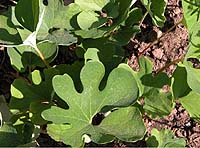
|
| Young bloodroot plant |
Sanguinaria canadensis
Common Names
Bloodroot, coonroot, pauson, puccoon, puccoon root, red
Indian paint, red puccoon, redroot, snakebite, sweet slumber, tetterwort,
turmeric, white puccoon
Description
A perennial that grows to 6 to 14 inches in height, with a
solitary leaf-stem. Leaves are palmately lobed around outer edge. In
early spring, produces white flowers 1 to 2 inches in width. A distinctive
characteristic of this plant is the red juice produced by the root.
Flowering Period
April to May.
Habitat
Deep, cool, moist, deciduous woodland slopes; rich woods.
Harvest
Rootstock at time of flowering, in late summer or early fall.
Range
Eastern North America
Duration
Perennial
Family Poppy
Uses
Bloodroot's alkaloid, sanguinarine, is used today in toothpaste and mouthwash. It
is an anesthetic, antiseptic, and shown to have some anticancer activity.
This plant is extremely poisonous. It is a source of morphine, and improper use should be avoided. The drug is an emetic, laxative, and emmenagogue; and because of its expectorant qualities, it has been used to treat chronic bronchitis. The plant is used both as a pain reliever and a sedative. When combined with oak bark, the roots give a red dye. In Appalachia, a piece of bloodroot is sometimes carried as a charm to ward off evil spirits.